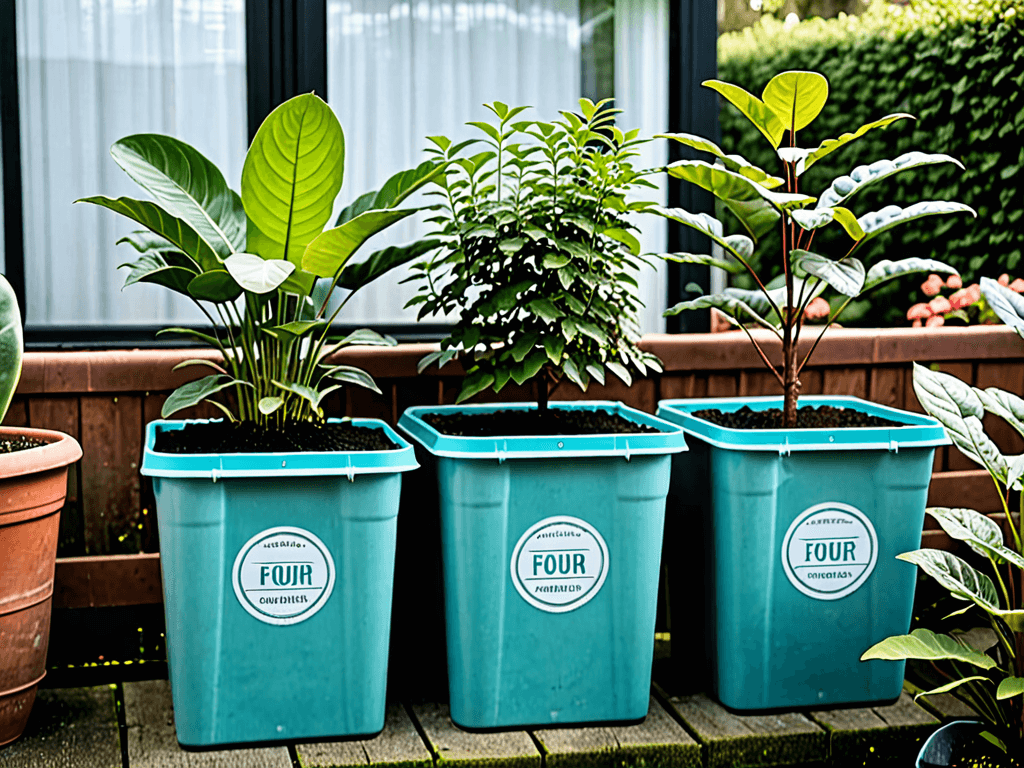Container gardening offers an excellent opportunity to grow thriving plants, be it on a balcony or in a small yard.
As urban spaces diminish, the art of cultivating plants in confined areas using buckets and pots has gained popularity.
In this guide, we will navigate through essential tips to maximize your container garden’s potential, explore suitable plants, and address common challenges encountered along the way.
Choosing the Right Containers
Choosing the right containers is crucial for healthy plants. The size, material, and drainage features greatly impact your garden’s success.
Size matters, as larger containers hold more soil, retaining moisture longer and providing room for root growth.
Material options range from lightweight plastic, which is easy to move, to traditional clay, ideal for plants needing dry conditions.
Ensure containers have adequate drainage holes to prevent root rot, and consider adding a layer of gravel at the bottom to enhance drainage efficiency.
Each choice influences the type and health of plants you can grow, so choose wisely.
Best Soil for Container Gardening
Selecting the best soil for container gardening is crucial for plant health.Potting mixes are specially designed to promote drainage and aeration, which are vital for roots.
Look for soil that contains perlite or vermiculite to improve drainage and prevent compaction.
Adding compost can enrich the soil with essential nutrients, enhancing plant growth.
Avoid using regular garden soil as it can retain too much moisture and may harbor pests or diseases.
A good soil mix should be lightweight, ensuring that oxygen reaches the roots easily, helping your plants flourish in a confined space.
Top Vegetables for Containers
Growing vegetables in containers is highly practical and rewarding.Tomatoes are a favorite due to their compact growth and heavy yield. Opt for dwarf or cherry varieties for easier management.
Peppers also thrive in pots, from sweet bell peppers to spicy chili varieties. Their colorful fruits can brighten your garden space.
Leafy greens like lettuce and spinach grow quickly and can be harvested multiple times, maximizing your yield.
Root vegetables such as carrots and radishes require deeper containers but are perfect for container gardening, offering a refreshing crunch to your meals.
Caring for Container Plants
Caring for container plants requires attention to several key factors.
Watering is crucial, as containers can dry out quickly. Check soil moisture regularly and water until it drains from the bottom.
Pruning helps maintain plant shape and encourages new growth. Remove any dead or yellowing leaves to keep the plant healthy.
Pest control is essential, as confined conditions can exacerbate infestations. Inspect plants frequently for signs of pests and use natural solutions like neem oil when possible.
Lastly, rotate your pots to ensure even growth, as it maximizes the plants’ exposure to sunlight.
Common Pests and Solutions
Managing common pests in container gardening requires vigilance and natural solutions.
Aphids can be a common issue; they cluster on new growth and underside leaves. To control them, spray plants with a mix of water and mild soap.
Spider mites often appear in dry conditions; increase humidity by misting plants or using neem oil.
Slugs and snails prefer the moist environment of potted plants; prevent them by using copper tape around the containers.
Regularly inspect your plants to catch these problems early and maintain their health and beauty.
Watering Tips for Containers
Watering container plants effectively ensures their health and growth.Check the soil regularly to determine when watering is needed, typically when the top inch is dry.Early morning watering is ideal as it allows water to soak in before the sun intensifies.
Containers can dry quickly, so on hot days, plants might require daily watering.
Drip irrigation systems or self-watering pots can help maintain consistent moisture levels.
Remember that different plants have varying moisture needs, so tailor your watering schedule accordingly.
Using Fertilizers Effectively
Using fertilizers effectively in container gardens can significantly boost plant growth and vitality.
Choose the right type of fertilizer, such as a balanced 10-10-10 formula, which provides equal parts of essential nutrients.
Liquid fertilizers are convenient for containers, allowing easy application through watering.
Apply fertilizers every 2-4 weeks, depending on plant needs and growth stage.
It is vital to avoid over-fertilizing, which can harm roots and lead to nutrient burn.
Always follow package instructions and adjust based on plant response for optimal results.
DIY Container Garden Ideas
Get creative with DIY container garden ideas to personalize your space. Use upcycled materials like old tires or wooden pallets as planters, bringing a rustic charm to your garden.
Vertical gardens made from shoe organizers or wall-mounted pockets save space and add greenery to small areas.
Create a hanging garden using recycled plastic bottles, perfect for herbs or smaller plants.
Experiment with colorful paint or patterns on your containers to blend or contrast with your outdoor decor.
Each project can be adapted to the plants you choose, fostering both beauty and sustainability.
Transform Your Space with Container Gardening
Container gardening is an accessible and versatile method to bring life to any space, regardless of size limitations.
By carefully choosing containers, soil, and plants, you can cultivate a thriving garden tailored to your environment and preferences.
Regular care including proper watering and pest control ensures that your garden flourishes, rewarding your efforts with beautiful blooms or bountiful harvests.
Embrace your creativity with DIY projects to personalize your container garden, making it a true reflection of your style.
Start your container gardening journey today and enhance your living space with greenery and flavor.
FAQ – Frequently Asked Questions about Container Gardening
What are the benefits of container gardening?
Container gardening allows you to grow plants in small or limited spaces, making it accessible for anyone.
What plants are best for containers?
Herbs, small vegetables like tomatoes and peppers, and flowering plants such as petunias are ideal for containers.
How often should I water my container plants?
Watering depends on the plant and weather conditions, but generally, when the top inch of soil feels dry.
Can I use garden soil in containers?
No, garden soil is often too dense for containers and can lead to poor drainage and root rot.
How do I prevent pests in container plants?
Regularly inspect plants, use natural deterrents like neem oil, and ensure proper plant hygiene to reduce pests.
Do container plants need fertilizer?
Yes, container plants benefit from regular fertilization as nutrients are washed away when watering.


